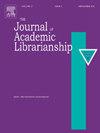The experiences of neurodivergent Library and Information Science [LIS] professionals working in academic libraries – a case study
IF 2.3
3区 管理学
Q2 INFORMATION SCIENCE & LIBRARY SCIENCE
引用次数: 0
Abstract
Literature on the experiences of neurodivergent LIS professionals working in academic libraries is sparse. Although anecdotal evidence suggests that librarianship may be an attractive profession for neurodivergent adults, significant challenges remain. This paper discusses a case study undertaken in a large research-intensive university in England. This case study investigates the experiences of neurodivergent LIS individuals, examining the impact of recruitment practices, the workplace environment, daily work and tasks, and their professional skills as perceived through the lens of neurodivergency. Qualitative data was collected through semi-structured interviews with six participants who identified as neurodivergent. A reflexive approach was taken to the research and thematic analysis used to analyse the results. This research finds that neurodivergent individuals encounter challenges with recruitment, the physical and sociocultural environment, and their daily work. This includes challenges with panel interviews, the sensory environment, the “unspoken rules” of social, professional expectations, and a conflicting desire for novelty and routine. Access to adjustments vary and are reliant on individual and institutional knowledge of neurodivergence, and the psychological safety required to disclose. Neurodivergent individuals are keen to use and develop their skills, however, employers appear nervous to discuss professional development opportunities. Although neurodivergent individuals are cautiously optimistic about their experiences, there is a need for increased understanding within the sector of their lived experiences to provide support. This paper puts forward recommendations for practice and identifies areas for future research that will help to improve the experiences of neurodivergent professionals.
神经发散型图书馆与信息科学专业人员在高校图书馆工作的经历——一个案例研究
关于在学术图书馆工作的神经发散性LIS专业人员的经历的文献很少。尽管坊间证据表明,对于神经分化的成年人来说,图书馆工作可能是一个有吸引力的职业,但重大挑战依然存在。本文讨论了在英国一所大型研究型大学进行的案例研究。本案例研究调查了神经发散性LIS个体的经历,考察了招聘实践、工作环境、日常工作和任务的影响,以及他们通过神经发散性感知的专业技能。定性数据是通过对六名神经发散性参与者的半结构化访谈收集的。对用于分析结果的研究和专题分析采取了反身性方法。这项研究发现,神经发散型个体在招聘、生理和社会文化环境以及日常工作中都会遇到挑战。这包括小组面试的挑战,感官环境,社会的“潜规则”,专业期望,以及对新奇和常规的冲突欲望。获得调整的途径各不相同,并且依赖于个人和机构对神经分化的了解,以及披露所需的心理安全。神经发散型的人热衷于运用和发展他们的技能,然而,雇主似乎对讨论职业发展机会感到紧张。尽管神经发散性个体对他们的经历持谨慎乐观的态度,但需要对他们的生活经历领域进行更多的理解,以提供支持。本文提出了实践建议,并确定了未来研究的领域,这将有助于提高神经发散专业人员的经验。
本文章由计算机程序翻译,如有差异,请以英文原文为准。
求助全文
约1分钟内获得全文
求助全文
来源期刊

Journal of Academic Librarianship
INFORMATION SCIENCE & LIBRARY SCIENCE-
CiteScore
5.30
自引率
15.40%
发文量
120
审稿时长
29 days
期刊介绍:
The Journal of Academic Librarianship, an international and refereed journal, publishes articles that focus on problems and issues germane to college and university libraries. JAL provides a forum for authors to present research findings and, where applicable, their practical applications and significance; analyze policies, practices, issues, and trends; speculate about the future of academic librarianship; present analytical bibliographic essays and philosophical treatises. JAL also brings to the attention of its readers information about hundreds of new and recently published books in library and information science, management, scholarly communication, and higher education. JAL, in addition, covers management and discipline-based software and information policy developments.
 求助内容:
求助内容: 应助结果提醒方式:
应助结果提醒方式:


